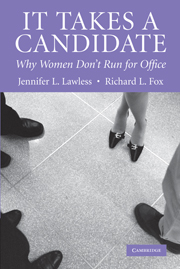Book contents
- Frontmatter
- Contents
- List of Tables
- List of Figures
- Acknowledgments
- 1 Electoral Politics: Still a Man's World?
- 2 Explaining Women's Emergence in the Political Arena
- 3 The Gender Gap in Political Ambition
- 4 Barefoot, Pregnant, and Holding a Law Degree: Family Dynamics and Running for Office
- 5 Gender, Party, and Political Recruitment
- 6 “I'm Just Not Qualified”: Gendered Self-Perceptions of Candidate Viability
- 7 Taking the Plunge: Deciding to Run for Office
- 8 Gender and the Future of Electoral Politics
- Appendix A The Citizen Political Ambition Study Sample Design and Data Collection
- Appendix B The Survey
- Appendix C The Interview Questionnaire
- Appendix D Variable Coding
- Works Cited
- Index
1 - Electoral Politics: Still a Man's World?
Published online by Cambridge University Press: 05 September 2012
- Frontmatter
- Contents
- List of Tables
- List of Figures
- Acknowledgments
- 1 Electoral Politics: Still a Man's World?
- 2 Explaining Women's Emergence in the Political Arena
- 3 The Gender Gap in Political Ambition
- 4 Barefoot, Pregnant, and Holding a Law Degree: Family Dynamics and Running for Office
- 5 Gender, Party, and Political Recruitment
- 6 “I'm Just Not Qualified”: Gendered Self-Perceptions of Candidate Viability
- 7 Taking the Plunge: Deciding to Run for Office
- 8 Gender and the Future of Electoral Politics
- Appendix A The Citizen Political Ambition Study Sample Design and Data Collection
- Appendix B The Survey
- Appendix C The Interview Questionnaire
- Appendix D Variable Coding
- Works Cited
- Index
Summary
Cheryl Perry made partner at a prestigious law firm in Hartford, Connecticut, when she was only thirty-three years old. She is active professionally, holding positions with the city's bar association and the Connecticut Trial Lawyers' Association. In addition, Ms. Perry served on the coordinating committee for the 1996 Olympics. Several of her peers in the legal community have repeatedly urged her to consider running for elective office. But when asked if she considers herself qualified to run, Ms. Perry replies, “Absolutely not. I'd never run.”
Tricia Moniz also looks like an excellent candidate for public office. A sociology professor at a large university, she has won four campus-wide teaching awards, is an authority in the areas of juvenile justice and diversity, and finds her expertise sought by numerous state and city agencies. Because of her professional experience, Professor Moniz works closely with community and political party leaders who regularly consult her on several public policy issues. When asked if she feels qualified to serve as an elected official, she laughs and says, “Lord no,” elaborating that she would not feel qualified to serve even at the local level.
Randall White also seems to fit the bill for entering the electoral arena. A college professor in Pennsylvania, he has published numerous works on biblical interpretation. A dedicated teacher with a strong interest in local politics, he frequently attends and speaks at city council meetings.
- Type
- Chapter
- Information
- It Takes a CandidateWhy Women Don't Run for Office, pp. 1 - 15Publisher: Cambridge University PressPrint publication year: 2005



